Antidepressants and the Truth
Antidepressants and the Truth
Listen to Professor Healy's ideas about antidepressants and the place for truth in medicine.
Listen to Professor Healy's ideas about antidepressants and the place for truth in medicine.
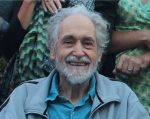 Dr. Bob Johnson's podcast offers one simple explanation for intractable psychological disturbances – traumatic origins are deeply buried. The sufferer cannot recall them without their frontal lobes becoming "blocked" – so however diligent and persistent the doctor is, the more they press these sufferers, the more tightly do they become obscure. If you don’t know what you're doing, you get nowhere. No wonder too many doctors have concluded that ’nothing works’. They then come to blame the patient, rather than their ignorance of the impact of trauma on speech centre and frontal lobes (see Bessel van der Kolk’s brainscan work).
Dr. Bob Johnson's podcast offers one simple explanation for intractable psychological disturbances – traumatic origins are deeply buried. The sufferer cannot recall them without their frontal lobes becoming "blocked" – so however diligent and persistent the doctor is, the more they press these sufferers, the more tightly do they become obscure. If you don’t know what you're doing, you get nowhere. No wonder too many doctors have concluded that ’nothing works’. They then come to blame the patient, rather than their ignorance of the impact of trauma on speech centre and frontal lobes (see Bessel van der Kolk’s brainscan work).
In 1991, Dr Bob Johnson began work as a psychiatrist, in a Special Unit inside a maximum security prison. This Unit was located in the UK’s then flagship prison, Parkhurst, on the Isle of Wight. The Unit was for prisoners regarded as too dangerous for Broadmoor, the pre-eminent UK high-security prison hospital. Over a five year period, he set out to persuade these violent men, including a number of known serial killers, that however horrendous their childhoods had been, they were now adult, so could let all their ‘nursery nightmares’ slide into the past, where they belonged.
In this podcast, he discusses with his wife Sue, how they came to move there, how the men reacted, and, as an introduction, what one of the more notorious UK prisoners thought of the whole affair. Charlie Bronson has made a name for himself in the media – here his heart-felt letter to Dr Bob gives a whole new slant on both himself, and on the work undertaken. Sue has written a graphic account of what it was like from her point of view. Happy viewing.
 During our 25th annual conference October 28-29, 2023, ISEPP announced the winners of its three awards:
During our 25th annual conference October 28-29, 2023, ISEPP announced the winners of its three awards:
ISEPP Lifetime Achievement Award - for recognition of sustained and dedicated efforts made throughout one’s career in the struggle to overturn the medical model of human distress. Presented to David Edward Walker, PhD. Click the link below to read the citation.
ISEPP Special Achievement Award - For recognition of specific projects and programs developed as alternatives to the orthodox mental health system. Presented to Rachel Flanigan, PhD. Click the link below to read the citation.
Mary Karon Memorial Award for Humanitarian Concerns - Named in honor of Mary Karon, wife of the late Bert Karon, who had been a lifelong activist psychologist and member of ISEPP. Mary and Bert were in a serious car accident in 2007, leaving Bert in need of constant and daily care. Mary provided that care with the hope of giving Bert the ability to continue in his fight against medicalized psychiatry. Mary died a few years later, making Bert promise that he would continue his work. This award is given to those who show a similar dedication to supporting the ISEPP mission. Presented to Sue Parry. Click the link below to read the citation.
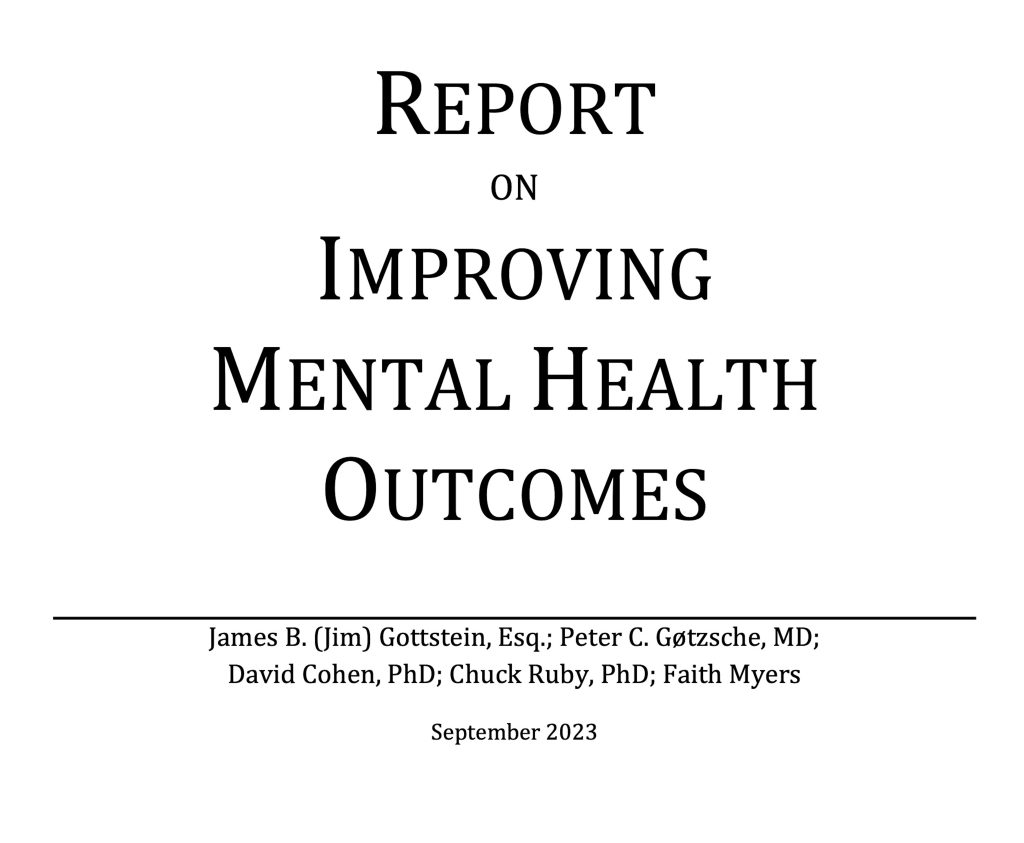 A new Report on Improving Mental Health Outcomes, a collaboration of scholars, activists, and survivors (James Gottstein, Esq, Peter C. Gøtzsche, MD, David Cohen, PhD, Chuck Ruby, PhD, and Faith Myers) argues that the mental health system's standard interventions (especially overreliance on drugs and incarceration into psychiatric facilities) are harmful, counter-productive, and forced on unwilling patients. These standard interventions turn upside down known facts about what helps people in distress while they violate principles of international law. The authors argue that People (relationships), Place (safe places to live), and Purpose (meaningful activities), alongside hope, all within a voluntary system of services, should be made broadly available via public and private programs. The authors describe over a dozen currently available approaches embodying these principles, which they suggest would both dramatically improve treatment outcomes and reduce treatment harms.
A new Report on Improving Mental Health Outcomes, a collaboration of scholars, activists, and survivors (James Gottstein, Esq, Peter C. Gøtzsche, MD, David Cohen, PhD, Chuck Ruby, PhD, and Faith Myers) argues that the mental health system's standard interventions (especially overreliance on drugs and incarceration into psychiatric facilities) are harmful, counter-productive, and forced on unwilling patients. These standard interventions turn upside down known facts about what helps people in distress while they violate principles of international law. The authors argue that People (relationships), Place (safe places to live), and Purpose (meaningful activities), alongside hope, all within a voluntary system of services, should be made broadly available via public and private programs. The authors describe over a dozen currently available approaches embodying these principles, which they suggest would both dramatically improve treatment outcomes and reduce treatment harms.
Don't delay. Register for the 25th Annual ISEPP Conference (Virtual) October 28-29, 2023. We have a stellar lineup.
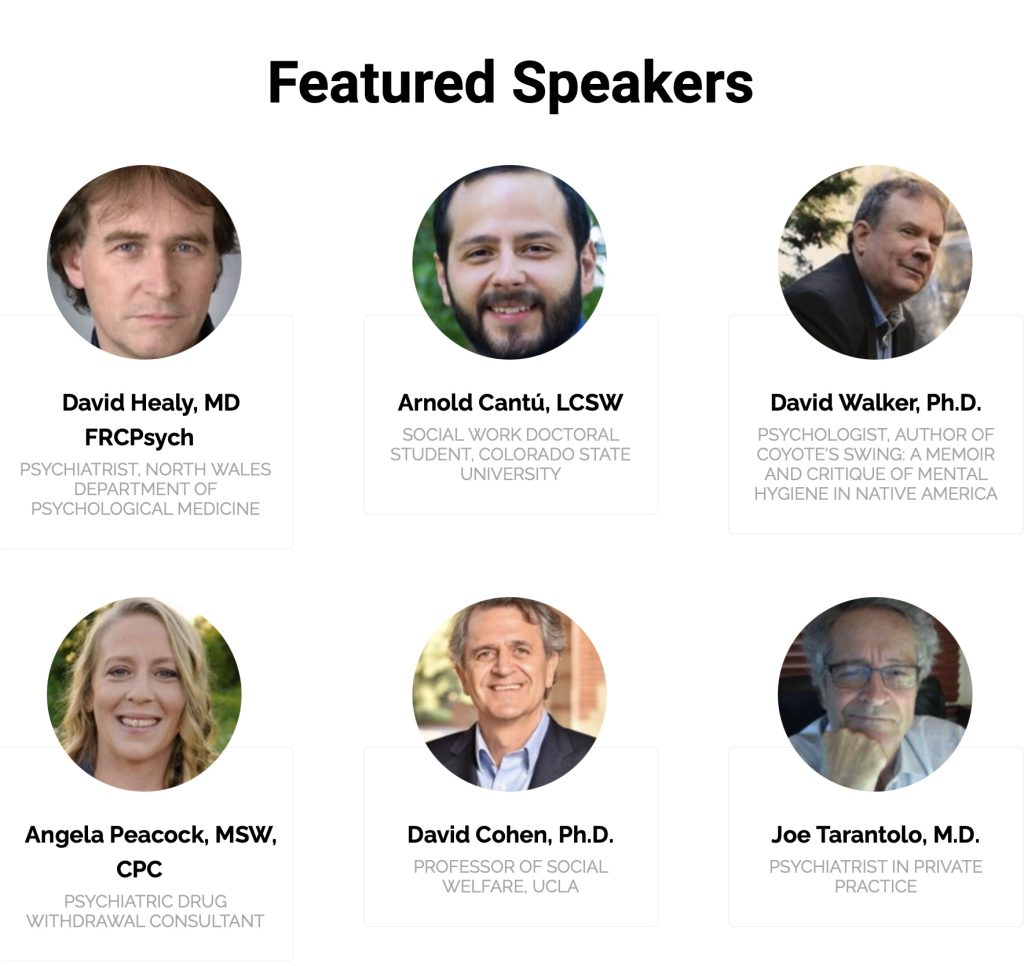
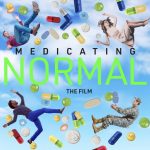
 The third paper from the benzodiazepine experience survey was released recently, reporting some of the long-term symptoms and life effects attributed by respondents to benzodiazepines. It also proposes a name for these enduring symptoms that many have experienced: benzodiazepine-induced neurological dysfunction (BIND).
The third paper from the benzodiazepine experience survey was released recently, reporting some of the long-term symptoms and life effects attributed by respondents to benzodiazepines. It also proposes a name for these enduring symptoms that many have experienced: benzodiazepine-induced neurological dysfunction (BIND).
FOR IMMEDIATE RELEASE
Benzodiazepine use associated with brain injury, job loss, and suicide
PORTLAND, Oregon, June 29, 2023 (eReleases) –
Benzodiazepine use and discontinuation is associated with nervous system injury and negative life effects that continue after discontinuation, according to an article published 06/29/2023 in the open access journal PLOS ONE.
“Despite the fact that benzodiazepines have been widely prescribed for decades, this survey presents significant new evidence that a subset of patients experience long-term neurological complications,” stated first author Alexis Ritvo, M.D. “This should change how we think about benzodiazepines and how they are prescribed.”
Previous studies had described this injury with various terminologies, perhaps the most well-known being protracted withdrawal. As part of the PLOS ONE study, a scientific review board unified these names under the term benzodiazepine-induced neurological dysfunction (BIND) to more accurately describe the condition.
To better characterize BIND, Dr. Ritvo and colleagues analyzed data from a previously published survey of current and former benzodiazepine users that asked about their symptoms and adverse life effects attributed to benzodiazepine use. The survey of 1,207 benzodiazepine users from benzodiazepine support groups and health/wellness sites is the largest of its kind. Respondents included those taking benzodiazepines (63.2%), in the process of tapering (24.4%), or fully discontinued (11.3%). Nearly all respondents had a prescription for benzodiazepines (98.6%) and 91% took them definitely or mostly as prescribed.
Symptoms were long-lasting, with 76.6% of all affirmative answers to symptom questions reporting symptom duration to be months or over one year. The following ten symptoms (out of a possible 23) persisted over a year in greater than half of respondents: low energy, difficulty focusing, memory loss, anxiety, insomnia, sensitivity to light and sounds, digestive problems, symptoms triggered by food and drink, muscle weakness, and body pain. Particularly alarming, these symptoms were often reported as new and distinct from the symptoms for which benzodiazepines were originally prescribed. In addition, a majority of respondents reported prolonged negative life impacts in all areas, such as significantly damaged relationships, job loss, and increased medical costs. Notably, 54.4% of the respondents reported suicidal thoughts or attempted suicide.
BIND is thought to be a result of brain changes resulting from benzodiazepine exposure. A general review of the literature suggests that it occurs in roughly 1 in 5 long-term users. The risk factors for BIND are not known, and more research is needed to further define the condition, along with treatment options.
Christy Huff, M.D., one of the co-authors, said, “Patients have been reporting long-term effects from benzodiazepines for over 60 years. I am one of those patients. Even though I took my medication as prescribed, I still experience symptoms on a daily basis at four years off benzodiazepines. Our survey and the new term BIND give a voice to the patient experience and point to the need for further investigations.”
The survey was a collaborative effort between CU Anschutz, Vanderbilt University Medical Center, and several patient-led advocacy organizations that educate on benzodiazepine harms. Several members of the research team have lived experience with benzodiazepines, which informed the survey questions.
Contact:
Primary Media Contact
Bernard Silvernail, President
Alliance for Benzodiazepine Best Practices
503-704-8983
bernie@benzoreform.org
benzoreform.org
Alternate Media Contact
Dr. Christy Huff, Director
Benzodiazepine Information Coalition
817-235-7879
christy@benzoinfo.com
benzoinfo.com
Research article:
"Long-term consequences of benzodiazepine-induced neurological dysfunction: A survey”
PLOS ONE 2023
https://journals.plos.org/plosone/article?id=10.1371/journal.pone.0285584
ISEPP announces its Spring 2023 webinar. Join us in the discussion!
Violence and Psychiatric Drugs:
Hope or Horror?
April 28, 2023
3-5pm Eastern
2-4pm Central
1-3pm Mountain
12-2pm Pacific
Webinar recording available $20
(No CEU credit for the recording)
 Our ISEPP colleague Bruce Levine, Ph.D., gives an interview on the Corbett Report podcast, Finding Mental Health. It summarizes Bruce's ideas in his book A Profession Without Reason in particular, and in general his ideas about how psychiatry and the medicalization of human life has been a failure. At around the 29:10 time mark, he mentions ISEPP as one of the many organizations dedicated to exposing this failure. Keep up the great work Bruce!
Our ISEPP colleague Bruce Levine, Ph.D., gives an interview on the Corbett Report podcast, Finding Mental Health. It summarizes Bruce's ideas in his book A Profession Without Reason in particular, and in general his ideas about how psychiatry and the medicalization of human life has been a failure. At around the 29:10 time mark, he mentions ISEPP as one of the many organizations dedicated to exposing this failure. Keep up the great work Bruce!
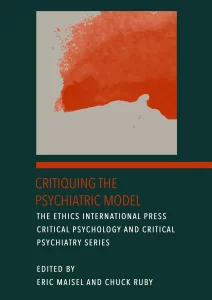 The Ethics International Press Critical Psychiatry and Critical Psychology Series was created by creativity coach and lead editor Eric Maisel, Ph.D. He is assisted in this project by his co-editor, psychologist Chuck Ruby, Ph.D. The books in this series are for everyone who would like to understand what’s wrong with the current “mental disorder” system, especially how chemicals are employed to deal with life’s problems.
The Ethics International Press Critical Psychiatry and Critical Psychology Series was created by creativity coach and lead editor Eric Maisel, Ph.D. He is assisted in this project by his co-editor, psychologist Chuck Ruby, Ph.D. The books in this series are for everyone who would like to understand what’s wrong with the current “mental disorder” system, especially how chemicals are employed to deal with life’s problems. 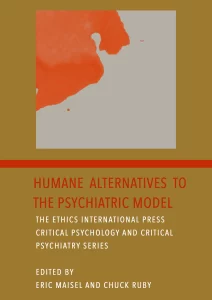
The first two volumes in the series,
Critiquing the Psychiatric Model and Humane Alternatives to the Psychiatric Model, have just come out in a lower-cost paperback (the hardback, for institutions, was pricey) and the publisher is offering an additional 20% off the paperback price. Just employ the code MORALS20 at checkout. These books will provide you with a picture—maybe even a life-changing picture—that you will not get in the mainstream media, which is dominated by the power of Big Pharma.
Come take a look. You will be very happy that you did!
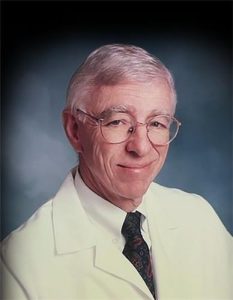 We are saddened to hear about the death of a legend in the critical psychiatry and psychology fight. Fred Baughman, M.D., died last October, peacefully at his home in El Cajon, California. Fred was a giant in the field and accomplished an incredible amount in his profession and well as creating a wonderful family environment at home. One of his many accomplishments was the publication of his 2006 book, The ADHD Fraud: How Psychiatry Makes Patients Out of Normal Children. The world will not be the same without him.
We are saddened to hear about the death of a legend in the critical psychiatry and psychology fight. Fred Baughman, M.D., died last October, peacefully at his home in El Cajon, California. Fred was a giant in the field and accomplished an incredible amount in his profession and well as creating a wonderful family environment at home. One of his many accomplishments was the publication of his 2006 book, The ADHD Fraud: How Psychiatry Makes Patients Out of Normal Children. The world will not be the same without him.